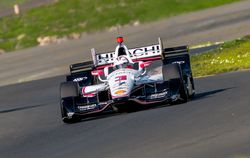Courtesy: Team Penske
Like almost everyone who knows Roger Penske, Will Power remembers the first time he spoke to him. It happened in the pits at Homestead-Miami Speedway in 2008.
"I was in line for qualifying," Power explains. "He came up and shook my hand and said, 'Hi, I'm Roger Penske. I've heard a lot of nice things about you.' I said, 'It's very nice nice to meet you.' I kept thinking, 'Damn, I should've shaved today. What's he going to think?'"
Helio Castroneves' favorite Roger moment came after Penske won the Daytona 500 for the first time in 2008 with Ryan Newman.
"I asked him, 'How do you do it?'" Castroneves recalls. "He said, 'I just love it.' I thought that was really cool. I was very happy to see that the team as a whole -- NASCAR and IndyCar -- was accomplishing things as a unit. It was great to see his face at that moment. He was happy and enthusiastic and accomplishing things in two series."
It began in 1966 as Roger Penske Racing, five years after Penske was named by Sports Illustrated as driver of the year in the Sports Car Club of America. Fifty years later, Team Penske is recognized as the most powerful enterprise in American motorsports, having 16 Indianapolis 500 victories and 13 IndyCar championships, and nearly 100 NASCAR Sprint Cup victories and a championship to its credit.
In all, Team Penske has recorded more than 420 major race wins, more than 480 pole positions and 28 national championships in open-wheel, stock car and sports car racing. It has won the Daytona 500 twice and owns victories in the 24 Hours of Daytona and the 12 Hours of Sebring, and even a Formula One win. In 50 years, more than 80 drivers have raced for Roger Penske.
Team Penske will try to add to its legacy at the GoPro Grand Prix of Sonoma at Sonoma Raceway, a race it has won five times, including three times with Power (2010, 2011 and 2013). The effort to score a sixth Sonoma victory will be undertaken by a four-car team consisting of Power, Castroneves, Juan Pablo Montoya and Simon Pagenaud.
Penske, now 79, doesn't plan to retire anytime soon.
"My sons and our family love the sport," Penske says. "It's a common thread through the company, so there's no reason not to be involved. If we can sustain the sponsorship and the key people stay with us and will continue to help us we can go on forever and I don't see any reason we can't do that."
One of the keys to Penske's success is also one of the keys to his success in business. A titan of the American automotive industry, Penske knows how hire the right people, then allows them to to do their job. In short, he doesn't micromanage every detail.
"If you ask him, he helps you," said Power, who has won more than 20 IndyCar races for Penske. "He's a very busy guy, so you don't want to bother him with unnecessary stuff. If you're having a bad race or a bad season, he'll step in and offer advice. He does that all the time. But usually you talk about the race weekend with him or things that are relevant to your situation at the time."
The winning is done with an element of unspoken polish. Penske isn't one to tout his team's accomplishments. They go without saying.
"That's why it's so special to be a part of this team," Castroneves says. "You see a lot of people bragging about what they've done, but Roger doesn't need to. In fact, a lot of times he keeps the accomplishments quiet. He doesn't want to mention them. Sometimes that makes us want to help him even more. We want to continue his legacy because of the modest way he handles things."
The man they call the "Captain" has been known to outwork younger generations, too.
"There have been countless times where I wake up in the morning, slept longer than normal, and the first thing that enters my mind is 'Gosh, Roger beat me to work by a long way,'" says Brad Keselowski, who won the Sprint Cup championship for Penske in 2012. "He motivates me to work harder. He pushes me in a direction that I didn't think of before. He has such a deep understanding on so many levels of what it takes to be successful that I find myself constantly trying to emulate him."
That's why it becomes important for Penske's drivers to win races and championships. They're doing it not only for themselves, but for him. When Power won his IndyCar championship in 2014 after years of coming close, he saw it as repayment to Penske for hiring him.
"To finally repay Roger for giving me a shot was important to me," Power says. "I felt good that I was able to perform straight out of the box for him and show him that he'd made the right decision. I felt good that I hadn't been a waste of their time or effort. We didn't win the championship straight out of the box, but we were competitive. When we did win the championship, I was happy to be able to get it for him."
With 50 years down and many more to go, additional victories and championships lie just around the next corner




